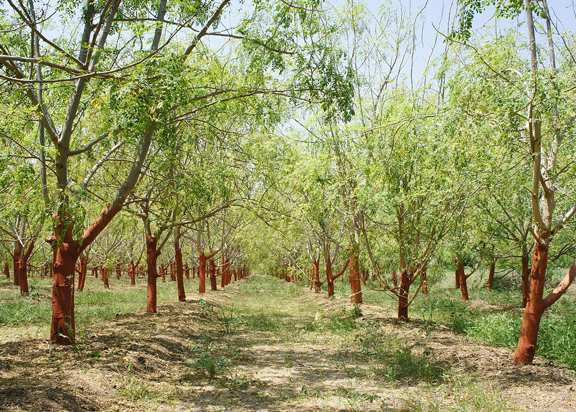Loved By Fidel Castro, This Indian Tree is Helping Fight Climate Change in Africa’s Maghreb!
A unique initiative in Tunisia is using India's moringa tree to transform Maghreb’s agricultural landscape and fight against desertification.

In Arabic, the word Maghreb means “where and when the sun sets.” The word also denotes a region, which includes Algeria, Libya, Morocco, and Tunisia, that is a part of both Africa and the Arab world.
A diverse melting pot of European, African, and Arabic influences, Maghreb is known for its unique cultural landscape. However, in the recent years, these countries have been much in the news for their worsening water scarcity and desertification.
As vast swaths of countryside turn to arid desert due to the combined effects of intensive modern farming, dwindling fresh water supplies and rising temperatures, the race is on to ensure there is enough fertile land left for agriculture – a vital lifeline for the people of all the Maghreb countries.
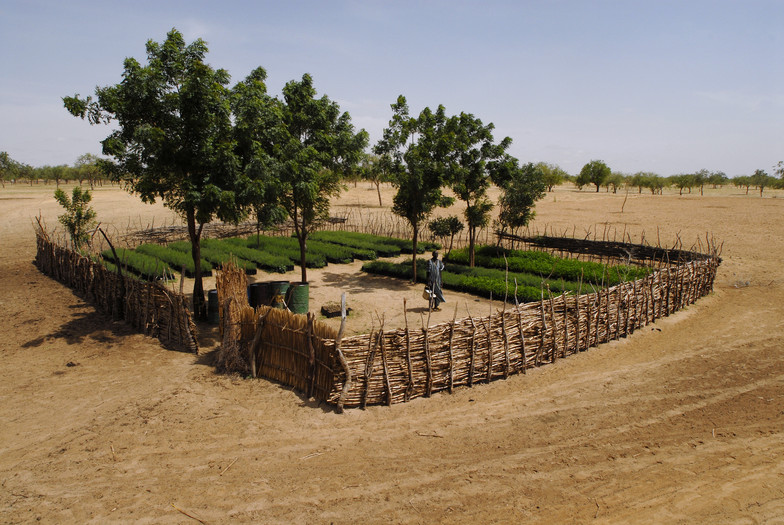
As a part of this fight against water scarcity and desertification, a unique initiative in Tunisia is using the natural strengths of an ancient Indian tree to transform Maghreb’s agricultural landscape.
The tree is Moringa, an Asian acacia species that came to the country from the Indian sub-continent, and the initiative is Acacias for All, a sustainable farming enterprise started by Sarah Toumi.
In 2011, following the Tunisian revolution, Sarah (a French national born to a Tunisian father) decided to leave her comfortable life in Paris and return to Tunisia to address the pressing issues facing the people of her homeland.
Water scarcity had reached a critical point in the region; rural poverty was rampant and severe droughts were becoming frequent. Much of this was due to the country’s water-intensive agricultural sector, that consumed nearly 76% of total freshwater usage in the region.
Despite this, the selection of crops being cultivated and system of agriculture in Tunisia had remained unchanged for years, with the chosen crops continuing to consume vast quantities of water.
The turning point finally came when Sarah saw her grandparents’ date farm succumbing to the effects of desertification.
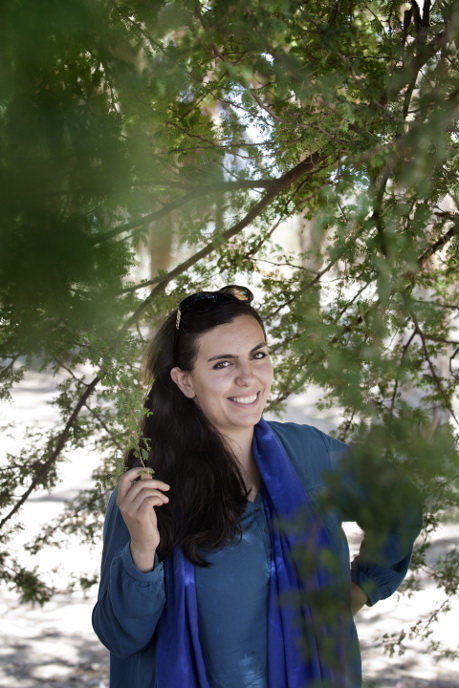
That’s when she decided to use the environmental knowledge gained by her during her university days. She presented an idea to the Tunisian government to create a green belt of acacia trees — more precisely, moringa — to protect rural lands from the sand and wind.
When this idea was rejected by the government, instead of giving up on it, Sarah started a crowdfunding campaign and used the raised money to establish a moringa nursery. She then convinced local women to join her in planting them in green belts and on their own farms instead of water-greedy crops such as olives and almonds.
Just a few months later Sarah was nominated as a young changemaker by Ashoka’s Youth Venture. This helped her formulate a professional business plan for her venture which she named “Acacias for All.” She then launched her pilot project in the Tunisian village of Bir-Salah, in which the tree nursery was accompanied by a demonstration centre on alternative agricultural practices.
Next, to enable local farmers to shift to sustainable agriculture and create higher economic returns, Sarah organized them into cooperatives.
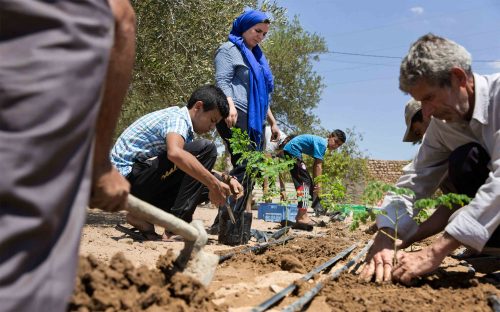
The idea was simple. In return for planting the new crops, Acacias for All would provide the trees, the training to grow and harvest them i.e. cut the branches, dry the leaves and reduce them to a powder. This nutrient-rich powder was transformed into food supplements, honey and herbal teas that are then sold through shops which the social enterprise has negotiated contracts.
Once established, this cooperative structure allows the farmers to further diversify into alternative crops (such as olives and almonds), learn new techniques, market their own products and, more importantly, gain financial and food security
Till date, Acacias for All has catalyzed the planting of nearly 50000 moringa trees. Sarah — chosen by Forbes as one of its “30 under 30” entrepreneurs in 2016, and recently appointed to the Presidential Council for Africa initiative by the French president — now plans to take this number to one million by 2018.
As for, why moringa? Because it is a tree (better known as drumstick in India) that is perfectly adapted to a dry and water-scarce environment.
Not only does its deep roots allow it to draw water from as far as 100 metres underground, but it also creates a natural barrier against erosion.
Moringa doesn’t need intensive irrigation or artificial fertilisers and can be irrigated with water that has up to 8 grams of salt per litre (as opposed to other traditional crops that cannot be cultivated with water that has more than 3 grams of salt per litre).
Moreover, the fast-growing, drought-resistant tree’s canopy protects the soil from losing excess moisture and restores it through nitrogen fixation, enhancing the regenerating capability of the soil. It can also be mulched after harvesting to increase soil fertility.
This hardy “miracle” tree has also earned a reputation as an easy-to-grow and naturally bio-fortified superfood that has the potential to alleviate hunger and nutrient deficiency in the developing world — a serving of fresh moringa leaves has more vitamin A than found in four carrots and more vitamin C than seven oranges!
There are non-nutritional benefits too. The seeds can be pressed to make a vegetable oil, and the leftover seed cake can be used to purify drinking water. (It contains a protein that makes bacteria glom together and die.) When dried, crushed seeds can also serve as a good fertilizer.
Unsurprisingly, in the country where it was first cultivated domestically, the humble moringa has been an integral part of the diet for years with its medicinal properties being extolled for centuries.
It grows in most parts of India though it’s probably more ubiquitous in Southern India. In fact, its botanical name takes its name from Murungai (in Tamil) or Muringa (in Malayalam).
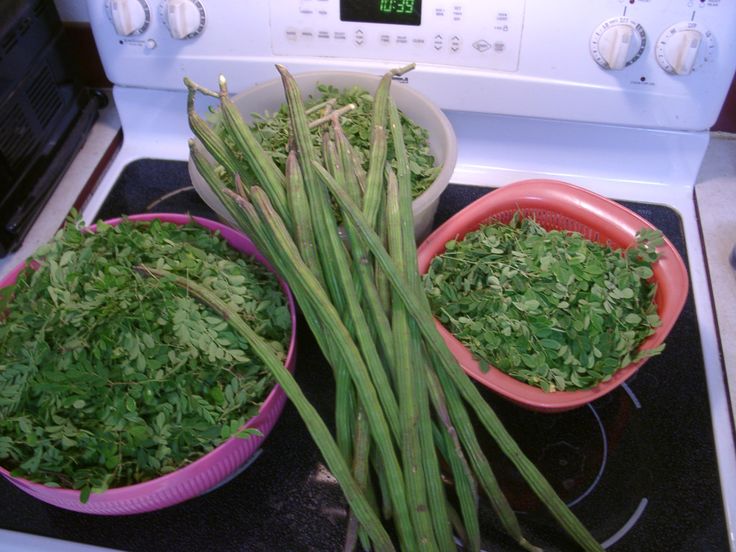
However, while this indigenous superfood has been taking the world by storm, India is yet to properly utilise its immense potential to address the bleak malnutrition scenario in the country. Another fact that remains under-utilised in India is that moringa as a drought-resilient food supply may hold the key to surviving the hotter, drier days to come.
With climate change acting as a hunger risk multiplier in dryland regions across the world, ideas and positive results brought about by Maghreb’s Acacias for All initiative can serve as a blueprint for tackling the problems of nutrient deficiency and food insecurity without damaging the ecology.
Interestingly, Cuba’s Fidel Castro was a self-confessed fan of moringa and loved extolling its many benefits.
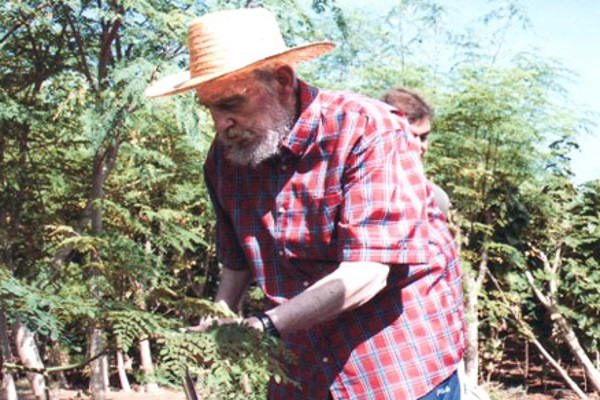
Castro once wrote on cubadebate,
“Originally from India, Moringa is the only plant that has every kind of amino acid. With proper planting and management, its green-leaf production can exceed 300 tons per hectare in a year. It has dozens of medicinal properties.”
Like this story? Or have something to share? Write to us: [email protected], or connect with us on Facebook and Twitter.
NEW: Click here to get positive news on WhatsApp!
This story made me
-
97
-
121
-
89
-
167
Tell Us More
We bring stories straight from the heart of India, to inspire millions and create a wave of impact. Our positive movement is growing bigger everyday, and we would love for you to join it.
Please contribute whatever you can, every little penny helps our team in bringing you more stories that support dreams and spread hope.








